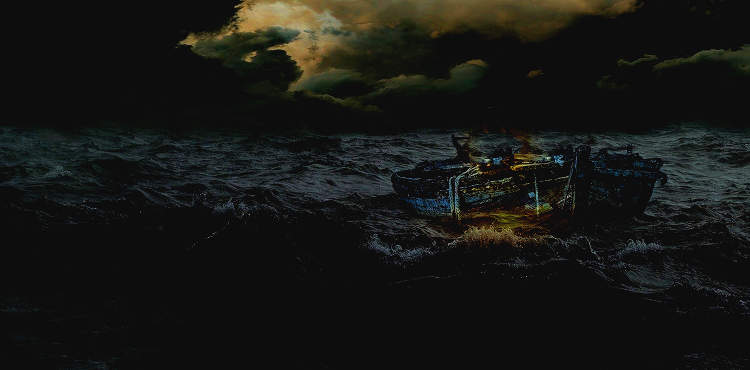Driftwood
a short story - B2 English
WITH AUDIO. ►: Click to open/close audio player
A
troubling short story from beside the North Sea
 It all began when the lights went out. I was just
sitting down to watch
the News at Ten on
television one stormy evening last January, when
everything went black.
It all began when the lights went out. I was just
sitting down to watch
the News at Ten on
television one stormy evening last January, when
everything went black."Damn," I thought, hunting round for a torch. "The fuses have gone." Ella found a torch in a drawer and a feeble gleam of light filled the room. I went to the fuse box and opened it up; all the fuses were O.K.
"It's a power cut, isn't it?" said Ella.
I could hear her in the kitchen looking for the candles. Suddenly she called. "Jim, there's a couple of dogs barking outside the window. They're in the garden, I can see them!"
"So what?"
"Well get rid of them, we don't want dogs in the garden: how did they get in anyway? The gate's shut."
"Must be the storm; it's blown the gate open."
Grabbing a walking stick, I went out into the garden. The whole village was in darkness, except for a couple of jabs of light from torches down the road; but I couldn't see any dogs.
The wind was surging in off the sea, and I could hear the roar of the surf on the beach beyond the dunes; as for the gate, it was shut. I supposed the dogs had got in through a hole in the fence.
It was just then that I heard the barking; or at least it sounded like barking. And shouting too. It was coming from the sand-dunes. In the dark of the storm, I couldn't really make out land from sky, but if I was not mistaken, there were people on the top of the dunes, and they seemed to be waving their arms. For a moment, I thought I saw torches, then it was all dark again. I decided to investigate.
Going inside, I grabbed my cape and hat; "I'm just going down to the dunes," I called, "I think there's someone down there having problems. It's probably old Tom and his boat."
The rain was cutting my face as I unlocked the back gate and made my way across the grass to the dunes. It didn't matter that it was pitch dark out there; I knew the way so well that I could have crossed the dunes blindfolded with my hands tied behind my back.
I still thought I could hear voices; in fact, I was sure I could. For a moment it sounded like children screaming. I quickened my pace. Perhaps someone was in trouble. Maybe I should have brought a rope and a lifejacket.
The sand fell away under my feet as I climed to the ridge of the dunes and looked over. Shielding my eyes from the spray-flecked wind, I peered into the darkness. Now I could hear nothing but the wind in my ears, and see nothing but the unbroken lines of the crashing waves. There was no sign of any people.
I looked back towards the house: the lights had come back on again, but between me and the village, I could see the beam of a torch; someone was coming towards me.
A voice called: "That you Jim?"
It was Old Tom, I could recognize his voice a mile off.
"What's going on? What's the noise?"
"I don't know. I can't see anything. Did you hear voices too?"
"Sounded like shouting," said Tom as he puffed up to the top of the ridge. He shone his torch in the direction of the rolling waves, but its weak beam showed nothing except rain, pebbles and the dunes.
"Where's your boat Tom?"
"Oh she's O.K. I pulled her up last week when they said there'd be storms...." He paused. "Funny that, you know. I could have sworn I heard shouting."
"How did you know it was me?" I asked. "You must have eyes like a night hawk."
"No, Ella said you'd come over here. I came out 'cos I heard the dogs barking, then I heard the voices, so I came to get you."
We listened. "They've stopped," he added.
"I guess it was just sound effects with the wind and the waves."
"I suppose so. There's nothing here."
A particularly violent gust of wind almost blew us off our feet.
"C'mon Tom, let's get back inside. The lights are on again. Come and have a nightcap!"
* * *
I opened a can of beer, Tom preferred his usual tot of rum.
"Funny about those voices," he said after a while. "It reminds me of a story my Grandfather always used to tell me when I was a kid, all about the night when a Dutch barque was blown ashore here. Half the people on board were drowned; there were kids among them. He was a kid too at the time. It must have been a very long time ago."
Tom went home, and I went to bed.
During the night, the storm died down. When the pale blue dawn broke, bands of silvery grey clouds stretched across the wind-swept sky.
Out of curiosity, I walked down to the beach before going off to work, just to see what it looked like.
The horizon was hard and wide, the stony beach was deserted. It was all quite normal. The only thing new was a small pile of waterlogged wooden planks on the shore.
"Driftwood", I thought. Tom'll have that for his fire."
WORD GUIDE
driftwood: wood that floats on the surface of the sea -
fuses: safety
devices on electric circuits - gleam: light - jab:
a ray of light - dunes: small
hills of sand beside the sea -
fence: wooden barrier -
cape: cloak, coat -
pitch dark: completely dark -
blindfolded:
with ones eyes covered - lifejacket:
jacket that helps you to float -
spray flecked: full of spots of water -
to puff: breathe sharply -
ridge: line of the top of a hill, or
raised bit of land - pebbles:
small rounded stones - to swear,
swore, sworn: be 100%
certain - gust: sharp
puff of wind -
nightcap: a drink before you go
to bed - tot: small
glass - ashore: onto the
shore - dawn: the start
of day -
waterlogged: impregnated with
water.
Return to Linguapress site index
► Discover more short stories from Linguapress
Copyright © Linguapress. Do not copy this document to any other website
Copying permitted for personal study, or by teachers for use with their students
Driftwood. Student worksheet
Comprehension: read or listen to the story on the audio file,
then answer
these questions:
1. What was Jim's first reaction, when the lights went out?
2. How did he think the dogs had got into the garden?
3. Why did Jim decide to go over to the dunes?
4. Why did he not take a torch with him?
5. What did he see beyond the dunes, when he got to the top?
6. Why did Tom come over to the Dunes?
7. How did Tom know that Jim was on the Dunes?
8. Why did the two men go back to Jim's house?
9. What did they do when they got there?
10. What happened to the Dutch barque mentioned by Tom?
Statement and implication: answer these other questions about the story:
1.
At what moment does Jim begin to get get worried?
2. How do you know that Jim knows the way to the dunes very well.
3. What sentence shows that Jim fears that there might be someone in danger.
4. Find at least four expressions in the story which imply uncertainty.
5. What did Tom and Jim expect to see beyond the sand dunes ?
6. What rational explanation can you give for the night's events?
2. How do you know that Jim knows the way to the dunes very well.
3. What sentence shows that Jim fears that there might be someone in danger.
4. Find at least four expressions in the story which imply uncertainty.
5. What did Tom and Jim expect to see beyond the sand dunes ?
6. What rational explanation can you give for the night's events?
Lesson plan
This story is accompanied by an audio file.Class method: Have pupils listen to it a first time, without following the printed or onscreen texts; then ask them these simple basic questions. What's the story about? When and where does it take place? Who are the three protagonists?
Explain some of the key words if pupils do not understand them: power cut, storm, fence, waves, driftwood.
Then play the audio file through a second time, allowing pupils to follow the text if they need to. A third reading may be necessary, but should not be for most classes, for though the story runs for over five minutes, the language is fairly simple.
Now either a) ask pupils to answer the questions above, or to tell the story in their own words - or both!
Only after you have done the comprehension questions and/or the résumé‚ exercise, should you then proceed to study the text in detail.
Text study: Have pupils pick out all the --ing words in this text (excluding words like evening, of course!) as they read through it, and divide them into different categories: progressive tenses (including the progressive infinitive form), verbal nouns (gerunds), adjectives, participles.
Next have pupils each select ten of the -ing words, and rewrite the sentence in which they occur, without using an ing form.
Note: before they do this, ask them which category of ing words it will be very difficult to modify? The answer is of course the progressive tense -ing forms.
Other ideas?
EFL teachers: Help develop this resource by contributing extra teaching materials or exercises.
To contribute click here for further details
Or visit the Linguapress guide
to working with written documents:
Reading comprehension in the English class
(Version française : Petite méthodologie de la compréhension écrite )
Reading comprehension in the English class
(Version française : Petite méthodologie de la compréhension écrite )
This
teaching
resource
is ©
copyright Linguapress renewed 2025.
Originally published in Freeway, the Intermediate level
English
newsmagazine.
Republication on other websites or in print is not authorised
| Linguapress; accueil en Français | Découvrez l'Angleterre (en français) | Discover Britain |



